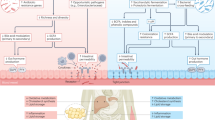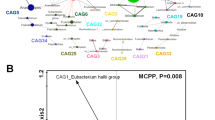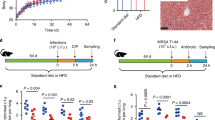Abstract
Early-life antibiotic exposure can disrupt the founding intestinal microbial community and lead to obesity later in life. Recent studies show that omega-3 fatty acids can reduce body weight gain and chronic inflammation through modulation of the gut microbiota. We hypothesize that increased tissue levels of omega-3 fatty acids may prevent antibiotic-induced alteration of gut microbiota and obesity later in life. Here, we utilize the fat-1 transgenic mouse model, which can endogenously produce omega-3 fatty acids and thereby eliminates confounding factors of diet, to show that elevated tissue levels of omega-3 fatty acids significantly reduce body weight gain and the severity of insulin resistance, fatty liver and dyslipidemia resulting from early-life exposure to azithromycin. These effects were associated with a reversal of antibiotic-induced dysbiosis of gut microbiota in fat-1 mice. These results demonstrate the beneficial effects of omega-3 fatty acids on antibiotic-induced gut dysbiosis and obesity, and suggest the potential utility of omega-3 supplementation as a safe and effective means for the prevention of obesity in children who are exposed to antibiotics.
This is a preview of subscription content, access via your institution
Access options
Subscribe to this journal
Receive 12 print issues and online access
$259.00 per year
only $21.58 per issue
Buy this article
- Purchase on Springer Link
- Instant access to full article PDF
Prices may be subject to local taxes which are calculated during checkout


Similar content being viewed by others
References
Trasande L, Blustein J, Liu M, Corwin E, Cox LM, Blaser MJ . Infant antibiotic exposures and early-life body mass. Int J Obes 2013; 37: 16–23.
Arnal M-E, Zhang J, Erridge C, Smidt H, Lallès J-P . Maternal antibiotic-induced early changes in microbial colonization selectively modulate colonic permeability and inducible heat shock proteins, and digesta concentrations of alkaline phosphatase and tlr-stimulants in swine offspring. PLoS ONE 2015; 10: e0118092.
Hersh AL, Shapiro DJ, Pavia AT, Shah SS . Antibiotic prescribing in ambulatory pediatrics in the United States. Pediatrics 2011; 128: 1053–1061.
Saiman L, Anstead M, Mayer-Hamblett N, Lands LC, Kloster M, Hocevar-Trnka J et al. Effect of azithromycin on pulmonary function in patients with cystic fibrosis uninfected with Pseudomonas aeruginosa: a randomized controlled trial. JAMA 2010; 303: 1707–1715.
Chassaing B, Gewirtz AT . Gut microbiota, low-grade inflammation, and metabolic syndrome. Toxicol Pathol 2014; 42: 49–53.
Tremaroli V, Backhed F . Functional interactions between the gut microbiota and host metabolism. Nature 2012; 489: 242–249.
Wlodarska M, Willing B, Keeney KM, Menendez A, Bergstrom KS, Gill N et al. Antibiotic treatment alters the colonic mucus layer and predisposes the host to exacerbated Citrobacter rodentium-induced colitis. Infect Immun 2011; 79: 1536–1545.
Patterson E, O' Doherty RM, Murphy EF, Wall R, O' Sullivan O, Nilaweera K et al. Impact of dietary fatty acids on metabolic activity and host intestinal microbiota composition in C57BL/6J mice. Br J Nutr 2014; 111: 1905–1917.
Kaliannan K, Wang B, Li XY, Kim KJ, Kang JX . A host–microbiome interaction mediates the opposing effects of omega-6 and omega-3 fatty acids on metabolic endotoxemia. Sci Rep 2015; 5: 11276.
Liu T, Hougen H, Vollmer AC, Hiebert SM . Gut bacteria profiles of Mus musculus at the phylum and family levels are influenced by saturation of dietary fatty acids. Anaerobe 2012; 18: 331–337.
Cao ZJ, Yu JC, Kang WM, Ma ZQ, Ye X, Tian SB . Effect of n-3 polyunsaturated fatty acids on gut microbiota and endotoxin levels in portal vein of rats fed with high-fat diet. Zhongguo Yi Xue Ke Xue Yuan Xue Bao 2014; 36: 496–500.
Kang JX, Wang J, Wu L, Kang ZB . Transgenic mice: fat-1 mice convert n-6 to n-3 fatty acids. Nature 2004; 427: 504.
Jaeggi T, Kortman GA, Moretti D, Chassard C, Holding P, Dostal A et al. Iron fortification adversely affects the gut microbiome, increases pathogen abundance and induces intestinal inflammation in Kenyan infants. Gut 2015; 64: 731–742.
Turnbaugh PJ, Ley RE, Mahowald MA, Magrini V, Mardis ER, Gordon JI . An obesity-associated gut microbiome with increased capacity for energy harvest. Nature 2006; 444: 1027–1031.
Sasaki M, Ogasawara N, Funaki Y, Mizuno M, Iida A, Goto C et al. Transglucosidase improves the gut microbiota profile of type 2 diabetes mellitus patients: a randomized double-blind, placebo-controlled study. BMC Gastroenterol 2013; 13: 81.
Cani PD, Bibiloni R, Knauf C, Waget A, Neyrinck AM, Delzenne NM et al. Changes in gut microbiota control metabolic endotoxemia-induced inflammation in high-fat diet-induced obesity and diabetes in mice. Diabetes 2008; 57: 1470–1481.
Acknowledgements
This study was supported by the generous funding from Sansun Life Sciences and the Fortune Education Foundation. We are also grateful to Marina Kang for her editorial assistance and Amy Goodale for her experimental assistance.
Author Contributions
JXK and KK designed the study; KK, BW, X-YL, and AKB performed experiments; KK and JXK analyzed data and wrote the paper.
Author information
Authors and Affiliations
Corresponding author
Ethics declarations
Competing interests
The authors declare no conflict of interest.
Additional information
Supplementary Information accompanies this paper on International Journal of Obesity website
Supplementary information
Rights and permissions
About this article
Cite this article
Kaliannan, K., Wang, B., Li, XY. et al. Omega-3 fatty acids prevent early-life antibiotic exposure-induced gut microbiota dysbiosis and later-life obesity. Int J Obes 40, 1039–1042 (2016). https://doi.org/10.1038/ijo.2016.27
Received:
Revised:
Accepted:
Published:
Issue Date:
DOI: https://doi.org/10.1038/ijo.2016.27
This article is cited by
-
The significance of microbiome in personalized medicine
Clinical and Translational Medicine (2019)
-
Enhanced nutrient supply and intestinal microbiota development in very low birth weight infants
Pediatric Research (2019)
-
Estrogen-mediated gut microbiome alterations influence sexual dimorphism in metabolic syndrome in mice
Microbiome (2018)
-
Maternal omega-3 fatty acids regulate offspring obesity through persistent modulation of gut microbiota
Microbiome (2018)
-
Diet, Gut Microbiota, and Colorectal Cancer Prevention: a Review of Potential Mechanisms and Promising Targets for Future Research
Current Colorectal Cancer Reports (2017)



